Unit 9 Can you come to my party 习题课件(共40张PPT) 2024-2025学年英语人教版八年级上册
文档属性
| 名称 | Unit 9 Can you come to my party 习题课件(共40张PPT) 2024-2025学年英语人教版八年级上册 | 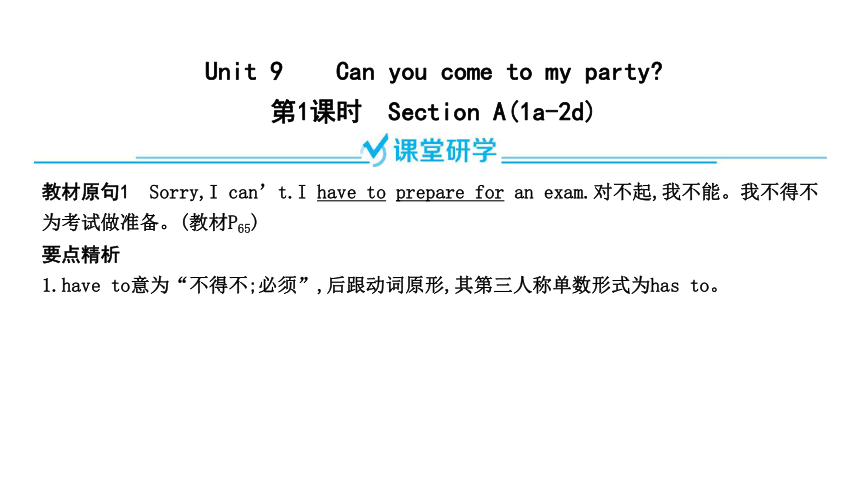 | |
| 格式 | pptx | ||
| 文件大小 | 551.4KB | ||
| 资源类型 | 教案 | ||
| 版本资源 | 人教新目标(Go for it)版 | ||
| 科目 | 英语 | ||
| 更新时间 | 2024-07-05 10:59:07 | ||
图片预览

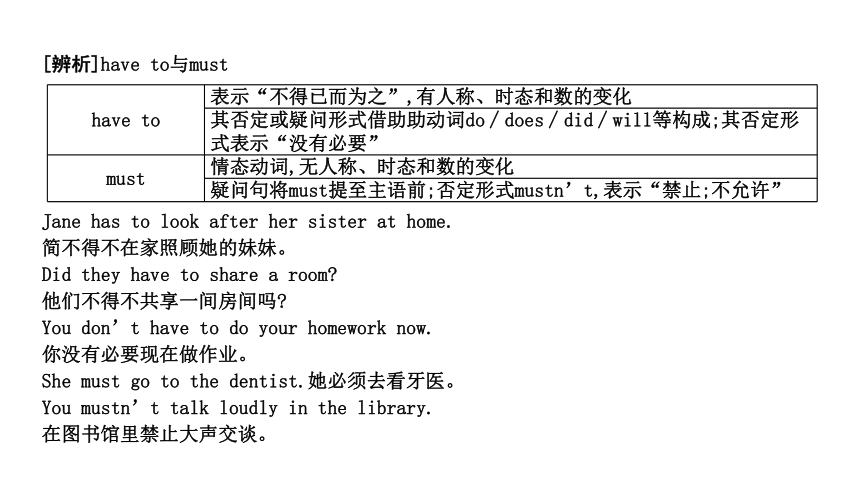
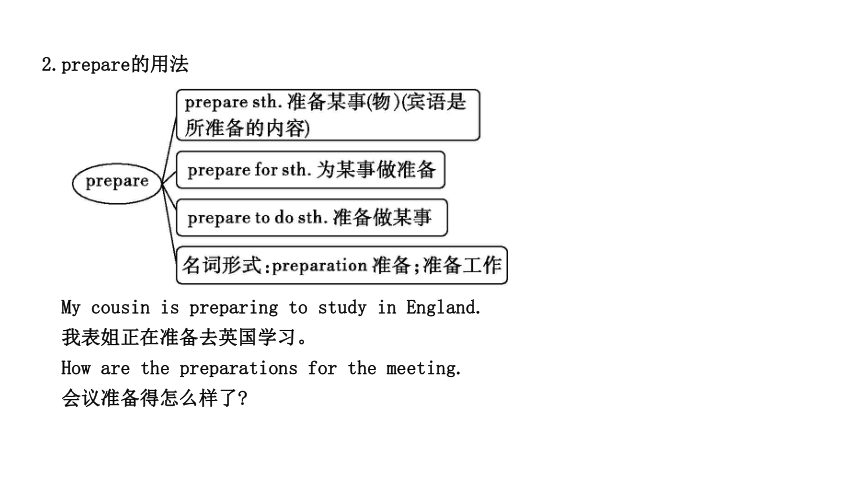
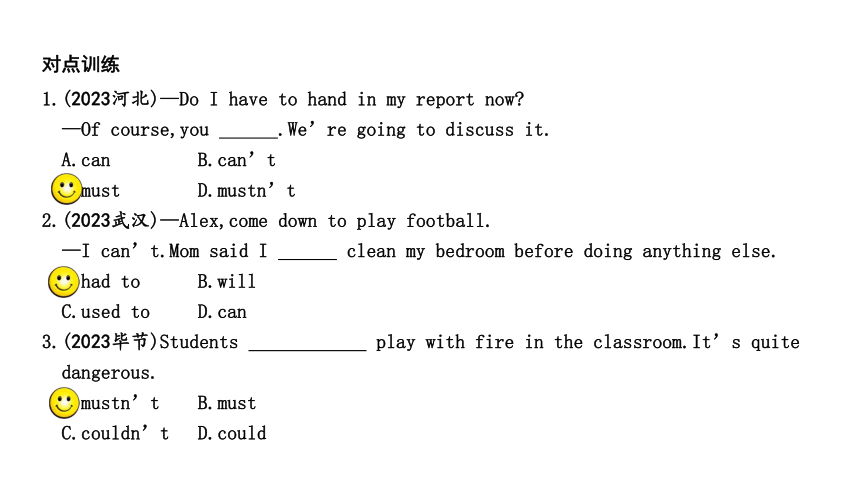
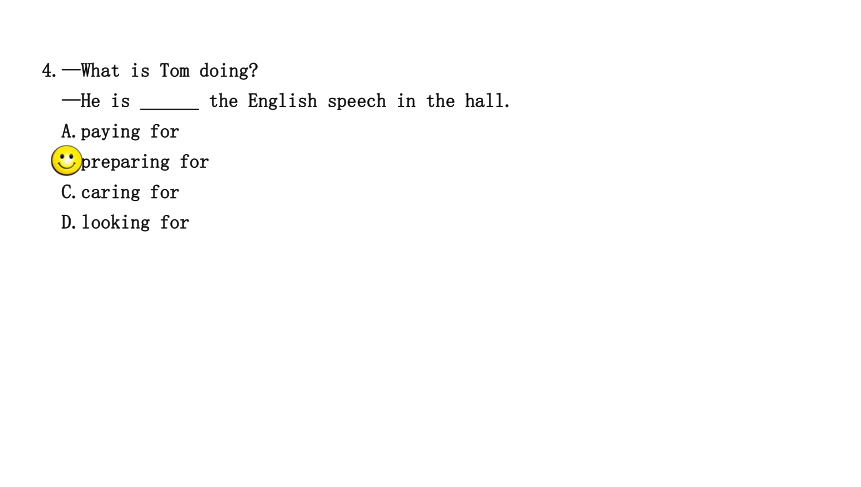
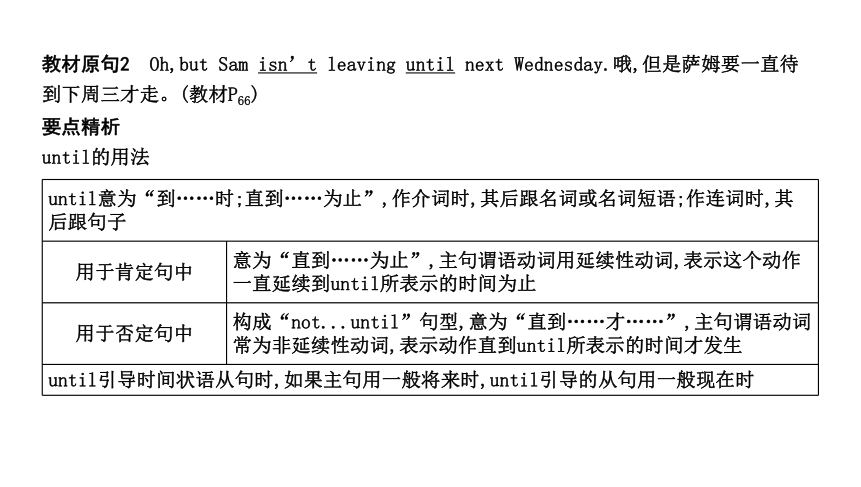
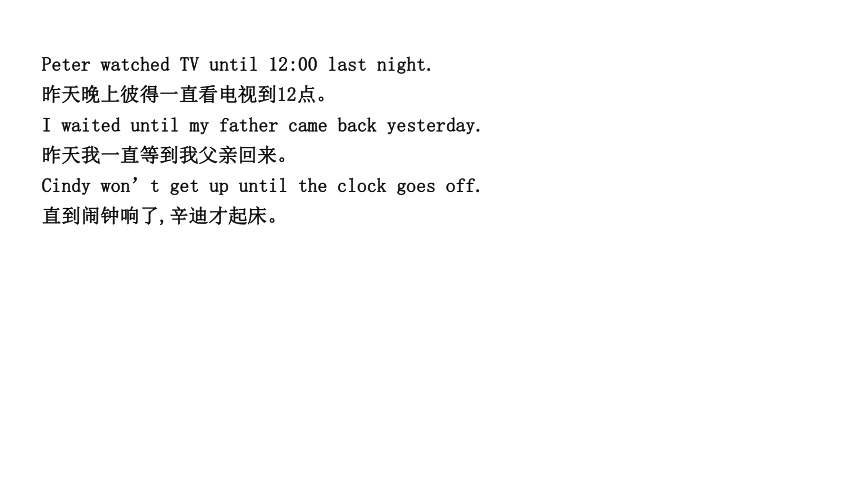
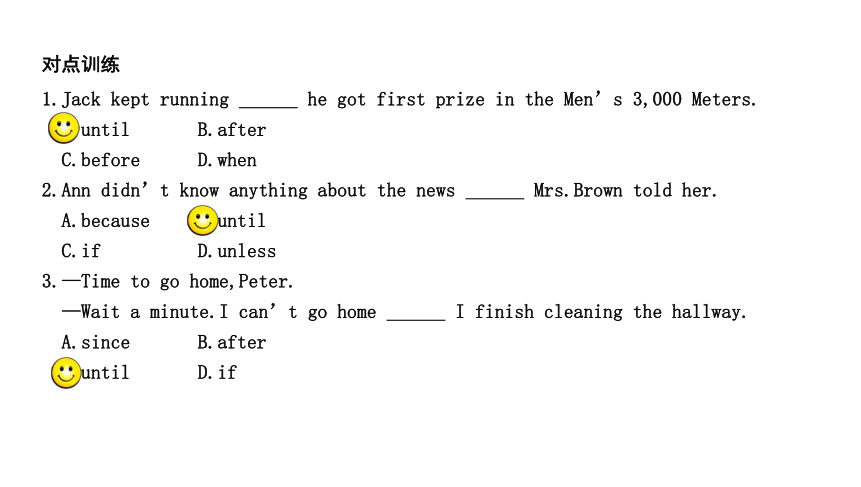
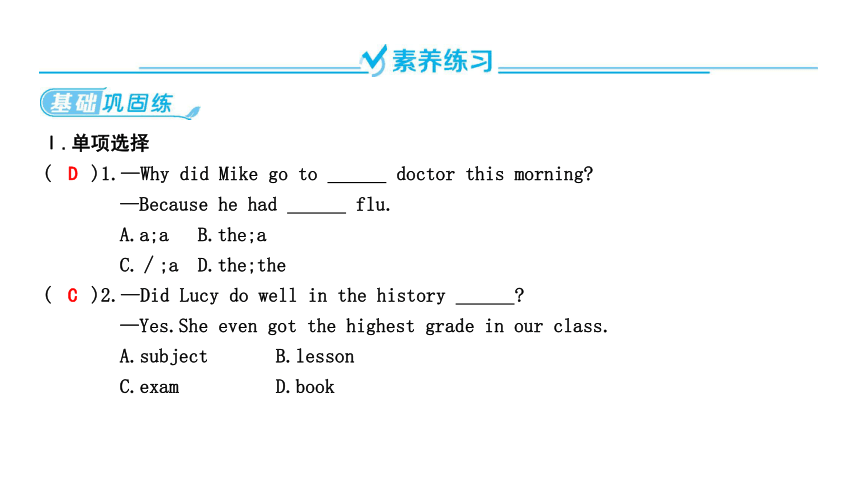
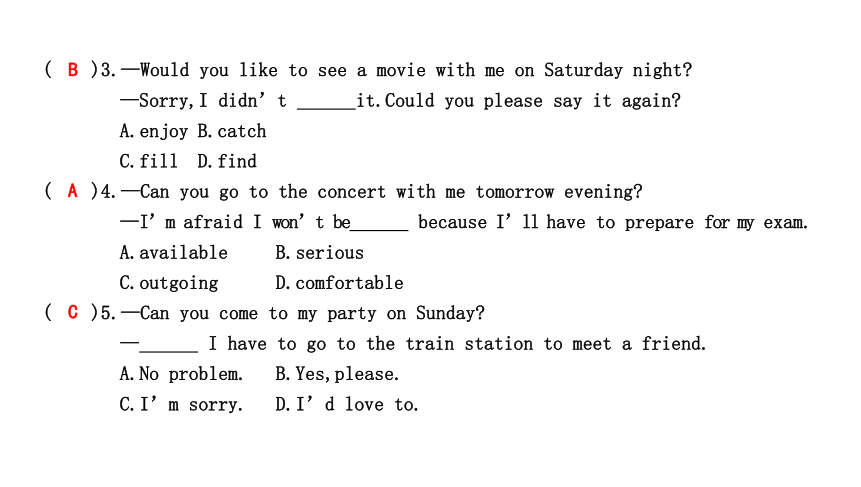
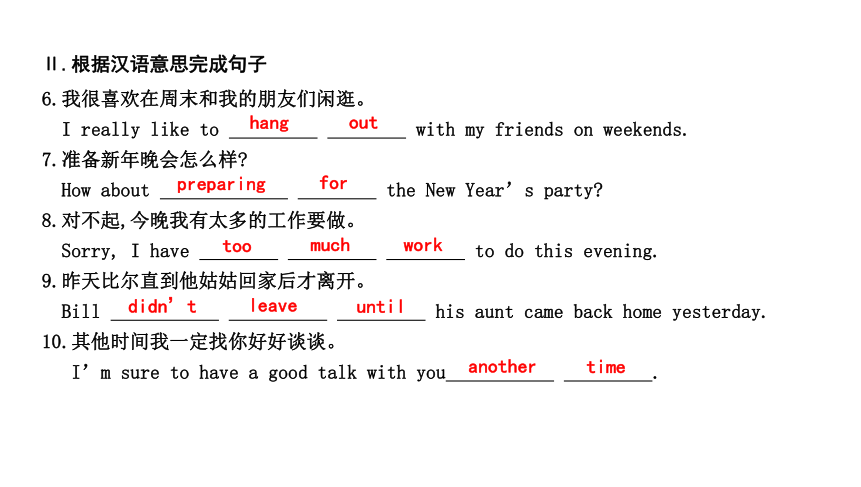
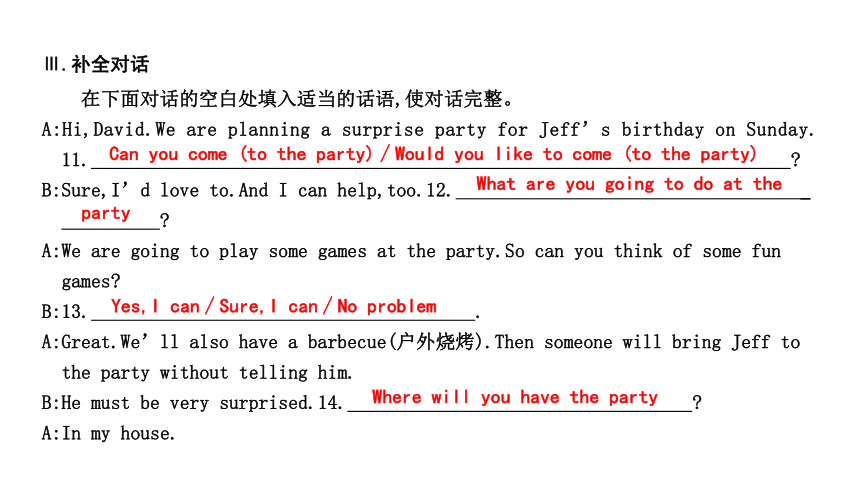
文档简介
(共40张PPT)
教材原句1 Sorry,I can’t.I have to prepare for an exam.对不起,我不能。我不得不为考试做准备。(教材P65)
Unit 9 Can you come to my party
第1课时 Section A(1a-2d)
要点精析
1.have to意为“不得不;必须”,后跟动词原形,其第三人称单数形式为has to。
[辨析]have to与must
have to 表示“不得已而为之”,有人称、时态和数的变化
其否定或疑问形式借助助动词do∕does∕did∕will等构成;其否定形式表示“没有必要”
must 情态动词,无人称、时态和数的变化
疑问句将must提至主语前;否定形式mustn’t,表示“禁止;不允许”
Jane has to look after her sister at home.
简不得不在家照顾她的妹妹。
Did they have to share a room
他们不得不共享一间房间吗
You don’t have to do your homework now.
你没有必要现在做作业。
She must go to the dentist.她必须去看牙医。
You mustn’t talk loudly in the library.
在图书馆里禁止大声交谈。
2.prepare的用法
My cousin is preparing to study in England.
我表姐正在准备去英国学习。
How are the preparations for the meeting.
会议准备得怎么样了
对点训练
1.(2023河北)—Do I have to hand in my report now
—Of course,you .We’re going to discuss it.
A.can B.can’t
C.must D.mustn’t
2.(2023武汉)—Alex,come down to play football.
—I can’t.Mom said I clean my bedroom before doing anything else.
A.had to B.will
C.used to D.can
3.(2023毕节)Students play with fire in the classroom.It’s quite
dangerous.
A.mustn’t B.must
C.couldn’t D.could
4.—What is Tom doing
—He is the English speech in the hall.
A.paying for
B.preparing for
C.caring for
D.looking for
教材原句2 Oh,but Sam isn’t leaving until next Wednesday.哦,但是萨姆要一直待到下周三才走。(教材P66)
要点精析
until的用法
until意为“到……时;直到……为止”,作介词时,其后跟名词或名词短语;作连词时,其后跟句子
用于肯定句中 意为“直到……为止”,主句谓语动词用延续性动词,表示这个动作一直延续到until所表示的时间为止
用于否定句中 构成“not...until”句型,意为“直到……才……”,主句谓语动词常为非延续性动词,表示动作直到until所表示的时间才发生
until引导时间状语从句时,如果主句用一般将来时,until引导的从句用一般现在时
Peter watched TV until 12:00 last night.
昨天晚上彼得一直看电视到12点。
I waited until my father came back yesterday.
昨天我一直等到我父亲回来。
Cindy won’t get up until the clock goes off.
直到闹钟响了,辛迪才起床。
对点训练
1.Jack kept running he got first prize in the Men’s 3,000 Meters.
A.until B.after
C.before D.when
2.Ann didn’t know anything about the news Mrs.Brown told her.
A.because B.until
C.if D.unless
3.—Time to go home,Peter.
—Wait a minute.I can’t go home I finish cleaning the hallway.
A.since B.after
C.until D.if
Ⅰ.单项选择
( )1.—Why did Mike go to doctor this morning
—Because he had flu.
A.a;a B.the;a
C.∕;a D.the;the
( )2.—Did Lucy do well in the history
—Yes.She even got the highest grade in our class.
A.subject B.lesson
C.exam D.book
D
C
( )3.—Would you like to see a movie with me on Saturday night
—Sorry,I didn’t it.Could you please say it again
A.enjoy B.catch
C.fill D.find
( )4.—Can you go to the concert with me tomorrow evening
—I’m afraid I won’t be because I’ll have to prepare for my exam.
A.available B.serious
C.outgoing D.comfortable
( )5.—Can you come to my party on Sunday
— I have to go to the train station to meet a friend.
A.No problem. B.Yes,please.
C.I’m sorry. D.I’d love to.
B
A
C
Ⅱ.根据汉语意思完成句子
6.我很喜欢在周末和我的朋友们闲逛。
I really like to with my friends on weekends.
7.准备新年晚会怎么样
How about the New Year’s party
8.对不起,今晚我有太多的工作要做。
Sorry, I have to do this evening.
9.昨天比尔直到他姑姑回家后才离开。
Bill his aunt came back home yesterday.
10.其他时间我一定找你好好谈谈。
I’m sure to have a good talk with you .
hang
out
preparing
for
too
much
work
didn’t
leave
until
another
time
Ⅲ.补全对话
在下面对话的空白处填入适当的话语,使对话完整。
A:Hi,David.We are planning a surprise party for Jeff’s birthday on Sunday.
11.
B:Sure,I’d love to.And I can help,too.12. _
A:We are going to play some games at the party.So can you think of some fun
games
B:13. .
A:Great.We’ll also have a barbecue(户外烧烤).Then someone will bring Jeff to
the party without telling him.
B:He must be very surprised.14.
A:In my house.
Can you come (to the party)∕Would you like to come (to the party)
What are you going to do at the
party
Yes,I can∕Sure,I can∕No problem
Where will you have the party
B:Great.15.
A:It will start at 7:00 p.m.You can come earlier.
B:OK.See you at the party!
When will it start
情态动词can的用法
一、含义
can是情态动词,没有人称和数的变化,但有时态的变化,它的过去式为could,其后接动词原形。
Section A(Grammar Focus-3c)
单元语法突破
二、用法
1.表示能力,指体力、知识、技能等方面的能力,意为“能够;会”,与be able to意思相同。
—Can you swim
——你会游泳吗
—Yes,I can.∕No,I can’t.
——是的,我会。∕不,我不会。
I can’t speak English or Japanese.
我不会说英语也不会说日语。
2.用于肯定句、否定句中表示许可,意为“可以”,相当于may(can比may更口语化,may较正式)。
You can∕may go home now.
你现在可以回家了。
I’m afraid you can’t smoke here.
恐怕你不能在这里吸烟。
3.(1)用于疑问句中表示请求,意为“可以……吗,能……吗”。此时它在用法上不如may正式,在语气
上不如could委婉。
Can you help me find it
你能帮我找到它吗
Can I play tennis with Mary,Mom
妈妈,我可以和玛丽一起打网球吗
(2)用于疑问句中,用于提出邀请。对其作肯定回答通常用“Sure.∕Of course.∕Certainly.(当然
可以。)∕Yes,I’d love (like) to.(我很乐意。)”等,作否定回答通常用“Sorry,I can’t.
(对不起,我不能。)∕ Sorry,I’m afraid I can’t.(对不起,恐怕我不能。)∕I’d love to,
but I...(我很乐意,但是我……)”等。
—Can you go to the baseball game with me
—Sure,I’d love to.
——你能和我去看棒球比赛吗
——当然,我愿意。
—Can you come to my party
—I’d love to,but I’m afraid I can’t.
——你能参加我的聚会吗
——我很乐意,但是恐怕我不能去。
4.用于否定句或疑问句中,表示推测。
Mr.Wang can’t be at home.
王老师不可能在家里。
Can the bike be Tom’s
这辆自行车可能是汤姆的吗
Ⅰ.单项选择
( )1.(2023柳州)—Can you play the guitar,Mark
—Yes,I .
A.can B.must
C.will
( )2.(2023雅安)—Excuse me. I sit here
—You’d better not.It’s the man’s seat.
A.Must B.Need
C.Could D.Should
A
C
( )3.— I take the magazine out of the reading room
—I’m sorry you .
A.Could;couldn’t B.Must;couldn’t
C.Will;can’t D.May;can’t
( )4.(2023扬州)Protect your hearing.Don’t wait until you hear a thing.
A.needn’t B.mustn’t
C.shouldn’t D.can’t
( )5.(2023海南)The boy be Tom.I saw him reading in the library just now.
A.shouldn’t B.can’t
C.needn’t
D
D
B
( )6.(2023百色)— you tell us a story in English
—I think I can do it.Let me try.
A.Need B.Can
C.Should D.Must
( )7.(2023怀化)—Whose English book is this
—It be Lily’s,but I’m not sure.
A.might B.can’t C.must
( )8.—Can you go to the concert with me, Dad
—
A.You’re welcome.
B.What a pity!
C.Sure, I’d love to.
D.Just so so.
B
A
C
( )9.(2023温州)—Thomas,where are my postcards I find them.
—They’re on the bookshelf.
A.can’t B.needn’t
C.mustn’t D.shouldn’t
( )10.—Jim, can you play table tennis with me after school
— I have to help my parents.
A.Of course.
B.Yes,I’d love to.
C.I hope not.
D.I’m afraid not.
A
D
Ⅱ.按要求完成下列句子
11.—Can you play soccer (作否定回答)
—No, .
12.Alice can sing well.(改为否定句)
Alice well.
13.Can you go to the party on Saturday (作肯定回答)
,I’d love to.
14.They can play the piano.(对画线部分提问)
What they
15.I can help you with English.(改为一般疑问句)
you me with English
I
can’t
can’t
sing
Yes∕Sure∕Certainly
can
do
Can
help
Ⅲ.根据汉语意思完成句子
16.他不可能真的病了。
He really ill.
17.——你能来我的聚会吗
——是的,我愿意去。
—Can you come to my party
—Yes, .
18.他篮球打得不好。
He basketball well.
19.你不可以将这本书拿到室外。
You the book out of the room.
can’t
be
I’d
love∕like
to
can’t
play
can’t
take
教材原句1 accept an invitation
接受邀请(教材P69)
第2课时 Section B(1a-2e)
要点精析
accept 意为“接受”,指主观上愿意接受
receive 意为“收到”,指客观上收到或拿到,但主观上不一定会接受
Although she received Allan’s invitation,she didn’t accept it.
尽管她收到了艾伦的邀请,但她没有接受。
对点训练
选词填空(accept,receive)
1.The moon the light from the sun.
2.On Teachers’ Day,we sent Mrs.Steen some beautiful flowers and she _
them happily.
3.(2024天津)My aunt offered me a dictionary and I it happily.
A.accepted B.invited
C.mixed D.grew
receives
accepted
教材原句2 Bring Ms.Steen to the party without telling her so that she can be surprised.在事先不告诉斯蒂恩老师的情况下,把她带到聚会上来,以便给她惊喜。(教
材P69)
要点精析
Sue made a cake without her mom’s help.
休在没有妈妈的帮助下,自己做了一个蛋糕。
Can you see clearly without your glasses (= Can you see clearly if you don’t wear your glasses )你不戴眼镜能看清楚吗
对点训练
1.Thanks to the video Visiting the World Online,we can enjoy the sight without
(leave) home.
2.(2024黔东南)—Ms.Huang,what would you like your afternoon tea
—Just a cup of coffee any sugar or milk.
A.for;without B.to;without
C.for;with D.to;with
leaving
教材原句3 I look forward to hearing from you all.我期盼着你们所有人的答复。(教材P69)
要点精析
1.look forward to意为“盼望;期待”,其中to是介词,而不是动词不定式符号,其后接名
词、代词或动词-ing形式。
Jenny is looking forward to a call from her penfriend.
珍妮在期待她笔友的来电。
We look forward to seeing you next Tuesday.
我们期望下周二见到您。
2.hear from意为“接到(某人的)信、电话等”,相当于get∕receive a letter∕
telephone call from sb.。切记hear from后接sb.,不能接letter,telephone等。
[辨析]hear,hear of与hear from
hear 意为“听到;听说”,强调听的结果。常见用法:hear sb.∕sth.或hear + that 从句
hear of 意为“听说”,后可跟名词、代词或动词-ing形式
hear from 意为“收到(某人的)信、电话等”,后跟表示人的名词或代词
I can’t hear you clearly.
我不能听清楚你说的话。
I hear that we will have an exam next Tuesday.
我听说我们下周二将举行一次考试。
Have you ever heard of the famous singer
你曾听说过这位著名的歌手吗
对点训练
1.(2024海南)—It’s said that the Shenzhou-14 astronauts will say hello to us
on Mid-Autumn Day.
—Wonderful! I’m it.
A.getting along with
B.staying away from
C.looking forward to
2.(2024恩施)昨天早上,我很开心收到了多年未见的朋友的来信。(hear)
To my great joy,I a friend whom I haven’t seen for years
yesterday morning.
3.David is looking forward to (take) a great vacation in the
countryside.
heard from
taking
Ⅰ.根据句意及汉语提示填写单词
1.Sally was (高兴) about my coming and showed me around her school.
2.Sam has to finish the article and (打印) it out this evening.
3.After Tony left the art club,they (删除) his name from the list.
4.For several minutes she did not (答复).
5.I’m sorry not to be able to accept your kind (邀请) to lunch
on the fifteenth.
glad
print
deleted
reply
invitation
Ⅱ.单项选择
( )6.We believe there are months of behind any successful event.
A.preparation B.pollution
C.information D.education
( )7.Don’t waste water.Water is very important and no one can live _ it.
A.with B.without
C.from D.beside
( )8.I asked Mary why she did that thing,but she did not .
A.accept B.shout
C.appear D.reply
A
B
D
( )9.We will be glad you any information you may need.
A.to send B.to sending
C.send D.sending
( )10.—Were you at the result
—Yes.We thought it was a result.
A.surprising;surprised
B.surprising;surprising
C.surprised;surprising
D.surprised;surprised
A
C
Ⅲ.根据汉语意思完成句子
11.我上周没有收到我父亲的来信。
I didn’t my father last week.
12.大家盼望着与你再次相见。
Everyone is seeing you again.
13.汤姆不明白为什么玛丽拒绝了他的帮助。
Tom didn’t understand why Mary his help.
14.去年他们去欧洲旅行,并在那里待了十天。
They to Europe last year and stayed there for ten
days.
15.我乐意帮忙做聚会的任何准备工作。
I’d be glad to any of the party preparations.
hear
from
looking
forward
to
turned
down
took
a
trip
help
out
with
本单元的话题为“邀请”。该话题写作的主要内容是用委婉的语言发出邀请、接受邀请或拒绝邀请,语言不但委婉,而且要给出充分、合理的理由。
Section B(3a-4)
话题写作指导
1.星期六下午你能来参加我的聚会吗
Can you on Saturday afternoon
2.我确信我们将会玩得很开心。
I’m we will a lot of .
3.我很乐意,但是我得照看我的妹妹。
I’d ,but I have to my younger sister.
4.这个周末我有太多的作业。
I have homework this weekend.
5.谢谢你的邀请。
your invitation.
come to my party
sure
have
fun
love to
look after
too much
Thanks for
1.写作要求
假如你是简(Jane),你的朋友玛丽(Mary)邀请你周六去参加她的生日聚会。但是你很忙,写一封电子邮件给她,向她表示感谢,说明你有一些事情要做(至少3件事情),不能参加了。并反过来邀请她在星期天下午与你一起去看电影。注意:词数80左右。
2.思路点拨
(1)体裁:应用文
(2)人称:第一人称
(3)时态:一般现在时
(4)写作导图:
3.范文借鉴
Dear Mary,
Thanks for inviting me to your birthday party.I’d love to go,but I’m afraid not.I’m really busy this Saturday.On Saturday morning,I have to go to the doctor because I have the flu.On Saturday afternoon,I have a piano lesson.On Saturday evening,I must look after my little sister,so I can’t go to your birthday party.But I’m free this Sunday.
Thanks for asking me again.I hope you can have a good time.Can you go to the movies with me on Sunday afternoon I hope you can make it.
Yours,
Jane
谢谢观赏!
教材原句1 Sorry,I can’t.I have to prepare for an exam.对不起,我不能。我不得不为考试做准备。(教材P65)
Unit 9 Can you come to my party
第1课时 Section A(1a-2d)
要点精析
1.have to意为“不得不;必须”,后跟动词原形,其第三人称单数形式为has to。
[辨析]have to与must
have to 表示“不得已而为之”,有人称、时态和数的变化
其否定或疑问形式借助助动词do∕does∕did∕will等构成;其否定形式表示“没有必要”
must 情态动词,无人称、时态和数的变化
疑问句将must提至主语前;否定形式mustn’t,表示“禁止;不允许”
Jane has to look after her sister at home.
简不得不在家照顾她的妹妹。
Did they have to share a room
他们不得不共享一间房间吗
You don’t have to do your homework now.
你没有必要现在做作业。
She must go to the dentist.她必须去看牙医。
You mustn’t talk loudly in the library.
在图书馆里禁止大声交谈。
2.prepare的用法
My cousin is preparing to study in England.
我表姐正在准备去英国学习。
How are the preparations for the meeting.
会议准备得怎么样了
对点训练
1.(2023河北)—Do I have to hand in my report now
—Of course,you .We’re going to discuss it.
A.can B.can’t
C.must D.mustn’t
2.(2023武汉)—Alex,come down to play football.
—I can’t.Mom said I clean my bedroom before doing anything else.
A.had to B.will
C.used to D.can
3.(2023毕节)Students play with fire in the classroom.It’s quite
dangerous.
A.mustn’t B.must
C.couldn’t D.could
4.—What is Tom doing
—He is the English speech in the hall.
A.paying for
B.preparing for
C.caring for
D.looking for
教材原句2 Oh,but Sam isn’t leaving until next Wednesday.哦,但是萨姆要一直待到下周三才走。(教材P66)
要点精析
until的用法
until意为“到……时;直到……为止”,作介词时,其后跟名词或名词短语;作连词时,其后跟句子
用于肯定句中 意为“直到……为止”,主句谓语动词用延续性动词,表示这个动作一直延续到until所表示的时间为止
用于否定句中 构成“not...until”句型,意为“直到……才……”,主句谓语动词常为非延续性动词,表示动作直到until所表示的时间才发生
until引导时间状语从句时,如果主句用一般将来时,until引导的从句用一般现在时
Peter watched TV until 12:00 last night.
昨天晚上彼得一直看电视到12点。
I waited until my father came back yesterday.
昨天我一直等到我父亲回来。
Cindy won’t get up until the clock goes off.
直到闹钟响了,辛迪才起床。
对点训练
1.Jack kept running he got first prize in the Men’s 3,000 Meters.
A.until B.after
C.before D.when
2.Ann didn’t know anything about the news Mrs.Brown told her.
A.because B.until
C.if D.unless
3.—Time to go home,Peter.
—Wait a minute.I can’t go home I finish cleaning the hallway.
A.since B.after
C.until D.if
Ⅰ.单项选择
( )1.—Why did Mike go to doctor this morning
—Because he had flu.
A.a;a B.the;a
C.∕;a D.the;the
( )2.—Did Lucy do well in the history
—Yes.She even got the highest grade in our class.
A.subject B.lesson
C.exam D.book
D
C
( )3.—Would you like to see a movie with me on Saturday night
—Sorry,I didn’t it.Could you please say it again
A.enjoy B.catch
C.fill D.find
( )4.—Can you go to the concert with me tomorrow evening
—I’m afraid I won’t be because I’ll have to prepare for my exam.
A.available B.serious
C.outgoing D.comfortable
( )5.—Can you come to my party on Sunday
— I have to go to the train station to meet a friend.
A.No problem. B.Yes,please.
C.I’m sorry. D.I’d love to.
B
A
C
Ⅱ.根据汉语意思完成句子
6.我很喜欢在周末和我的朋友们闲逛。
I really like to with my friends on weekends.
7.准备新年晚会怎么样
How about the New Year’s party
8.对不起,今晚我有太多的工作要做。
Sorry, I have to do this evening.
9.昨天比尔直到他姑姑回家后才离开。
Bill his aunt came back home yesterday.
10.其他时间我一定找你好好谈谈。
I’m sure to have a good talk with you .
hang
out
preparing
for
too
much
work
didn’t
leave
until
another
time
Ⅲ.补全对话
在下面对话的空白处填入适当的话语,使对话完整。
A:Hi,David.We are planning a surprise party for Jeff’s birthday on Sunday.
11.
B:Sure,I’d love to.And I can help,too.12. _
A:We are going to play some games at the party.So can you think of some fun
games
B:13. .
A:Great.We’ll also have a barbecue(户外烧烤).Then someone will bring Jeff to
the party without telling him.
B:He must be very surprised.14.
A:In my house.
Can you come (to the party)∕Would you like to come (to the party)
What are you going to do at the
party
Yes,I can∕Sure,I can∕No problem
Where will you have the party
B:Great.15.
A:It will start at 7:00 p.m.You can come earlier.
B:OK.See you at the party!
When will it start
情态动词can的用法
一、含义
can是情态动词,没有人称和数的变化,但有时态的变化,它的过去式为could,其后接动词原形。
Section A(Grammar Focus-3c)
单元语法突破
二、用法
1.表示能力,指体力、知识、技能等方面的能力,意为“能够;会”,与be able to意思相同。
—Can you swim
——你会游泳吗
—Yes,I can.∕No,I can’t.
——是的,我会。∕不,我不会。
I can’t speak English or Japanese.
我不会说英语也不会说日语。
2.用于肯定句、否定句中表示许可,意为“可以”,相当于may(can比may更口语化,may较正式)。
You can∕may go home now.
你现在可以回家了。
I’m afraid you can’t smoke here.
恐怕你不能在这里吸烟。
3.(1)用于疑问句中表示请求,意为“可以……吗,能……吗”。此时它在用法上不如may正式,在语气
上不如could委婉。
Can you help me find it
你能帮我找到它吗
Can I play tennis with Mary,Mom
妈妈,我可以和玛丽一起打网球吗
(2)用于疑问句中,用于提出邀请。对其作肯定回答通常用“Sure.∕Of course.∕Certainly.(当然
可以。)∕Yes,I’d love (like) to.(我很乐意。)”等,作否定回答通常用“Sorry,I can’t.
(对不起,我不能。)∕ Sorry,I’m afraid I can’t.(对不起,恐怕我不能。)∕I’d love to,
but I...(我很乐意,但是我……)”等。
—Can you go to the baseball game with me
—Sure,I’d love to.
——你能和我去看棒球比赛吗
——当然,我愿意。
—Can you come to my party
—I’d love to,but I’m afraid I can’t.
——你能参加我的聚会吗
——我很乐意,但是恐怕我不能去。
4.用于否定句或疑问句中,表示推测。
Mr.Wang can’t be at home.
王老师不可能在家里。
Can the bike be Tom’s
这辆自行车可能是汤姆的吗
Ⅰ.单项选择
( )1.(2023柳州)—Can you play the guitar,Mark
—Yes,I .
A.can B.must
C.will
( )2.(2023雅安)—Excuse me. I sit here
—You’d better not.It’s the man’s seat.
A.Must B.Need
C.Could D.Should
A
C
( )3.— I take the magazine out of the reading room
—I’m sorry you .
A.Could;couldn’t B.Must;couldn’t
C.Will;can’t D.May;can’t
( )4.(2023扬州)Protect your hearing.Don’t wait until you hear a thing.
A.needn’t B.mustn’t
C.shouldn’t D.can’t
( )5.(2023海南)The boy be Tom.I saw him reading in the library just now.
A.shouldn’t B.can’t
C.needn’t
D
D
B
( )6.(2023百色)— you tell us a story in English
—I think I can do it.Let me try.
A.Need B.Can
C.Should D.Must
( )7.(2023怀化)—Whose English book is this
—It be Lily’s,but I’m not sure.
A.might B.can’t C.must
( )8.—Can you go to the concert with me, Dad
—
A.You’re welcome.
B.What a pity!
C.Sure, I’d love to.
D.Just so so.
B
A
C
( )9.(2023温州)—Thomas,where are my postcards I find them.
—They’re on the bookshelf.
A.can’t B.needn’t
C.mustn’t D.shouldn’t
( )10.—Jim, can you play table tennis with me after school
— I have to help my parents.
A.Of course.
B.Yes,I’d love to.
C.I hope not.
D.I’m afraid not.
A
D
Ⅱ.按要求完成下列句子
11.—Can you play soccer (作否定回答)
—No, .
12.Alice can sing well.(改为否定句)
Alice well.
13.Can you go to the party on Saturday (作肯定回答)
,I’d love to.
14.They can play the piano.(对画线部分提问)
What they
15.I can help you with English.(改为一般疑问句)
you me with English
I
can’t
can’t
sing
Yes∕Sure∕Certainly
can
do
Can
help
Ⅲ.根据汉语意思完成句子
16.他不可能真的病了。
He really ill.
17.——你能来我的聚会吗
——是的,我愿意去。
—Can you come to my party
—Yes, .
18.他篮球打得不好。
He basketball well.
19.你不可以将这本书拿到室外。
You the book out of the room.
can’t
be
I’d
love∕like
to
can’t
play
can’t
take
教材原句1 accept an invitation
接受邀请(教材P69)
第2课时 Section B(1a-2e)
要点精析
accept 意为“接受”,指主观上愿意接受
receive 意为“收到”,指客观上收到或拿到,但主观上不一定会接受
Although she received Allan’s invitation,she didn’t accept it.
尽管她收到了艾伦的邀请,但她没有接受。
对点训练
选词填空(accept,receive)
1.The moon the light from the sun.
2.On Teachers’ Day,we sent Mrs.Steen some beautiful flowers and she _
them happily.
3.(2024天津)My aunt offered me a dictionary and I it happily.
A.accepted B.invited
C.mixed D.grew
receives
accepted
教材原句2 Bring Ms.Steen to the party without telling her so that she can be surprised.在事先不告诉斯蒂恩老师的情况下,把她带到聚会上来,以便给她惊喜。(教
材P69)
要点精析
Sue made a cake without her mom’s help.
休在没有妈妈的帮助下,自己做了一个蛋糕。
Can you see clearly without your glasses (= Can you see clearly if you don’t wear your glasses )你不戴眼镜能看清楚吗
对点训练
1.Thanks to the video Visiting the World Online,we can enjoy the sight without
(leave) home.
2.(2024黔东南)—Ms.Huang,what would you like your afternoon tea
—Just a cup of coffee any sugar or milk.
A.for;without B.to;without
C.for;with D.to;with
leaving
教材原句3 I look forward to hearing from you all.我期盼着你们所有人的答复。(教材P69)
要点精析
1.look forward to意为“盼望;期待”,其中to是介词,而不是动词不定式符号,其后接名
词、代词或动词-ing形式。
Jenny is looking forward to a call from her penfriend.
珍妮在期待她笔友的来电。
We look forward to seeing you next Tuesday.
我们期望下周二见到您。
2.hear from意为“接到(某人的)信、电话等”,相当于get∕receive a letter∕
telephone call from sb.。切记hear from后接sb.,不能接letter,telephone等。
[辨析]hear,hear of与hear from
hear 意为“听到;听说”,强调听的结果。常见用法:hear sb.∕sth.或hear + that 从句
hear of 意为“听说”,后可跟名词、代词或动词-ing形式
hear from 意为“收到(某人的)信、电话等”,后跟表示人的名词或代词
I can’t hear you clearly.
我不能听清楚你说的话。
I hear that we will have an exam next Tuesday.
我听说我们下周二将举行一次考试。
Have you ever heard of the famous singer
你曾听说过这位著名的歌手吗
对点训练
1.(2024海南)—It’s said that the Shenzhou-14 astronauts will say hello to us
on Mid-Autumn Day.
—Wonderful! I’m it.
A.getting along with
B.staying away from
C.looking forward to
2.(2024恩施)昨天早上,我很开心收到了多年未见的朋友的来信。(hear)
To my great joy,I a friend whom I haven’t seen for years
yesterday morning.
3.David is looking forward to (take) a great vacation in the
countryside.
heard from
taking
Ⅰ.根据句意及汉语提示填写单词
1.Sally was (高兴) about my coming and showed me around her school.
2.Sam has to finish the article and (打印) it out this evening.
3.After Tony left the art club,they (删除) his name from the list.
4.For several minutes she did not (答复).
5.I’m sorry not to be able to accept your kind (邀请) to lunch
on the fifteenth.
glad
deleted
reply
invitation
Ⅱ.单项选择
( )6.We believe there are months of behind any successful event.
A.preparation B.pollution
C.information D.education
( )7.Don’t waste water.Water is very important and no one can live _ it.
A.with B.without
C.from D.beside
( )8.I asked Mary why she did that thing,but she did not .
A.accept B.shout
C.appear D.reply
A
B
D
( )9.We will be glad you any information you may need.
A.to send B.to sending
C.send D.sending
( )10.—Were you at the result
—Yes.We thought it was a result.
A.surprising;surprised
B.surprising;surprising
C.surprised;surprising
D.surprised;surprised
A
C
Ⅲ.根据汉语意思完成句子
11.我上周没有收到我父亲的来信。
I didn’t my father last week.
12.大家盼望着与你再次相见。
Everyone is seeing you again.
13.汤姆不明白为什么玛丽拒绝了他的帮助。
Tom didn’t understand why Mary his help.
14.去年他们去欧洲旅行,并在那里待了十天。
They to Europe last year and stayed there for ten
days.
15.我乐意帮忙做聚会的任何准备工作。
I’d be glad to any of the party preparations.
hear
from
looking
forward
to
turned
down
took
a
trip
help
out
with
本单元的话题为“邀请”。该话题写作的主要内容是用委婉的语言发出邀请、接受邀请或拒绝邀请,语言不但委婉,而且要给出充分、合理的理由。
Section B(3a-4)
话题写作指导
1.星期六下午你能来参加我的聚会吗
Can you on Saturday afternoon
2.我确信我们将会玩得很开心。
I’m we will a lot of .
3.我很乐意,但是我得照看我的妹妹。
I’d ,but I have to my younger sister.
4.这个周末我有太多的作业。
I have homework this weekend.
5.谢谢你的邀请。
your invitation.
come to my party
sure
have
fun
love to
look after
too much
Thanks for
1.写作要求
假如你是简(Jane),你的朋友玛丽(Mary)邀请你周六去参加她的生日聚会。但是你很忙,写一封电子邮件给她,向她表示感谢,说明你有一些事情要做(至少3件事情),不能参加了。并反过来邀请她在星期天下午与你一起去看电影。注意:词数80左右。
2.思路点拨
(1)体裁:应用文
(2)人称:第一人称
(3)时态:一般现在时
(4)写作导图:
3.范文借鉴
Dear Mary,
Thanks for inviting me to your birthday party.I’d love to go,but I’m afraid not.I’m really busy this Saturday.On Saturday morning,I have to go to the doctor because I have the flu.On Saturday afternoon,I have a piano lesson.On Saturday evening,I must look after my little sister,so I can’t go to your birthday party.But I’m free this Sunday.
Thanks for asking me again.I hope you can have a good time.Can you go to the movies with me on Sunday afternoon I hope you can make it.
Yours,
Jane
谢谢观赏!
同课章节目录
- Unit 1 Where did you go on vacation?
- Section A
- Section B
- Unit 2 How often do you exercise?
- Section A
- Section B
- Unit 3 I'm more outgoing than my sister.
- Section A
- Section B
- Unit 4 What's the best movie theater?
- Section A
- Section B
- Unit 5 Do you want to watch a game show?
- Section A
- Section B
- Unit 6 I'm going to study computer science.
- Section A
- Section B
- Unit 7 Will people have robots?
- Section A
- Section B
- Unit 8 How do you make a banana milk shake?
- Section A
- Section B
- Unit 9 Can you come to my party?
- Section A
- Section B
- Unit 10 If you go to the party, you'll have a grea
- Section A
- Section B
